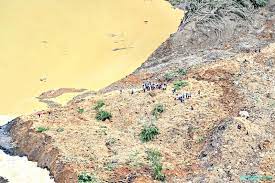Wake-up call: On Manipur landslides
Landslides in Manipur are related to avoidable, man-made actions
The landslide that occurred last week in the Tupul area in Manipur’s Noney district will go down as one of the severest natural disasters in the State, with the death toll reaching 38 and more than 25 people remaining trapped below the debris even as rescue efforts were on. The tragic disaster has been compounded by the debris of the landslide blocking the Ijei river, creating a significant welling up of water which could inundate low-lying areas if the “dam”-like structure is breached. While the administration has sought to ease the water outflow from the stored water, inclement weather has hampered the pace of the efforts and the government and disaster management officials must now take precautions to ensure that the consequences of the disaster do not snowball even further. The fact that such a disaster occurred in a railway construction site in a landslide-prone area should give development planners and government officials in the State pause. While the Himalayan States in northern India and other States with hill/ghat terrain such as Kerala have registered the bulk of landslides in the last decade or so according to government data, the number of such incidents in Manipur (20 between 2014 and 2020) is not insignificant. The relatively high number of casualties accompanying these landslides and the fact that the Environment Ministry has itself acknowledged that the disasters were “anthropogenically” induced are a matter of serious concern for the State. The Ministry identified the causes of landslides in Manipur as “a result of modification of slopes for construction, widening of road, quarrying for construction materials, fragile lithography, complex geological structures and heavy rainfall”.
As a post-facto exercise, the State government must look at whether sufficient soil and stability tests were done before choosing the site for railway construction work in the Tupul area. Researchers have corroborated the fact that the areas in western Manipur abutting the national highways fall under very high, high or moderate hazard zones. The severe landslide occurred in the Tupul area despite the government identifying susceptible areas in the State through the National Landslide Susceptibility Mapping project. The uncertain nature of rains, with the monsoon being more intense this year compared to predictions, has added to the problem. An early warning system for landslides is still being developed and refined by the Geological Survey of India and this could help reduce the scale of such disasters, once deployed across vulnerable States. While it is understandable that States in the Northeast are keen on accelerating connectivity projects to uplift a relatively economically backward region, disasters such as the landslide in Tupul point to the dangers of not taking ecological challenges related to deforestation seriously enough. This is a wake-up call for governments in States that are prone to landslides regularly.
